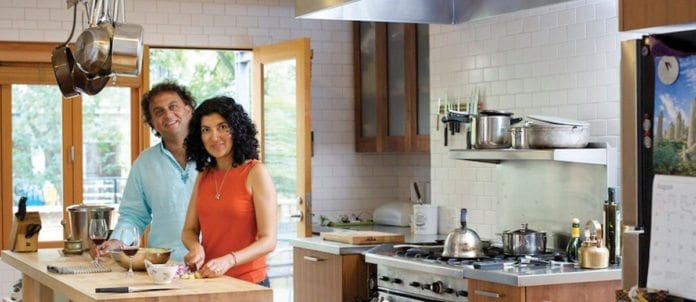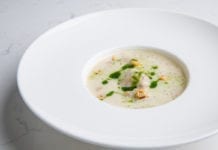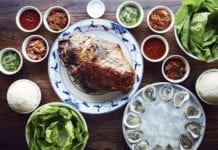A snapshot of Vikram Vij’s interview from F&H‘s Icons and Innovators breakfast series shows the chef’s affinity for offering good food and hospitality at his Vancouver restaurants.
Rosanna Caira: Tell us about your culinary roots.
Vikram Vij: I wanted to become a chef because my grandfather used to drink a bottle of scotch and smoke two packs of cigarettes a day. Every night, when he was a little drunk, he would put me on his lap and say to me: ‘You like to eat and cook — I like to drink, so why don’t we open a restaurant together? I will become a bartender in your restaurant, so I can drink for free’…. So, when I told him I wanted to be a chef, when I told my father I wanted to be a chef, it was in my mind that I was going to open a restaurant one day to honour my grandfather. So, the name of the restaurant, Vij’s, has nothing to do with Vikram Vij; it has to do with my grandfather.
RC: You went to school and worked in Austria, before an opportunity arose to come to Canada. What made you immigrate to Canada?
VV: As a young immigrant, I felt this was the best country for me, because [it] was going to give me the opportunity to be successful, as long as I put my heart and my soul into what I was doing. And, that’s what I did. This has always been my calling. I have always wanted to bring awareness of the food and the cuisine and the culture — I have always been a very proud Indian — and that’s what I wanted to showcase.
RC: You started working at Banff Springs Hotel in 1989 and opened your own
restaurant in 1994. That’s amazing, especially since you were new to the country.
VV: Financially, it was a big burden, because I had no money. So, my father came from India with $23,000 cash, in hundred dollar bills, which he cashed in India; he gave a bag of it to me and said, ‘Here, we open a restaurant together.’
RC: What was the mandate with that first restaurant?
VV: I always felt Indian cuisine was ‘tucked under the carpet’ as an ethnic cuisine…. Why is it that my cuisine is considered ethnic, and French and Italian are considered mainstream?…. It’s almost like a few people went to India in the 1960s, smoked pot in Goa and thought, ‘I know Indian food — it’s butter chicken and chicken tikka masala.’ Is there not more to Indian food than that?…. It really bothered me. [So, at the restaurant] we started roasting our own spices, grinding our own spices, adding things. So, rather than cutting corners, we started doing things slower. We roast our own onions, grind our own onions. I’d rather have four things on the menu and do them really well, than having these two-page menus…. I felt like we needed to bring Indian flavours, Indian home cooking, Indian hospitality.
RC: A year after opening, Vij’s was named Best Asian Restaurant, and The New York Times said it was “among the best Indian restaurants in the world.” How did you do it?
VV: It was [my wife] Meeru’s tenacity in the kitchen creating dishes. Meeru was born and brought up in the United States, but of Indian descent, so she knows the flavours and the spices. She really bonded well with my kitchen staff. In 19 years, I have never lost a kitchen staff member. You know why? Because [Meeru] is their shrink, and so every time they have issues about their mother-in-laws or their daughter-in-laws or their husbands, they talk to her…. I was on the floor, because people would come in and say, ‘Where’s butter chicken?’ and I would say, ‘I don’t serve that stuff, but just trust me — taste my food’…. I never ran Vij’s as a business. I ran it as if [you’re coming] to my house, and I’m going to take care of you. It was an extension of my house. I never worried about how many covers I did — that’s for the accountants to deal with. Money never motivated me. What motivated me was the fact that everybody walked out of the room and said, ‘Wow, this was the most delicious food I’ve ever had.’ And, that was the angle. All the accolades came, because I was at the front of the house and Meeru was managing the back of the house; it’s a marriage made in heaven.
RC: How do food trends influence your menu?
VV: I am conscientious of [them], but I am not going to cook my food based on a low-sodium diet…. I would add more cumin seeds or more spice and maybe add more lemon juice, rather than adding salt to enhance the flavour. As a chef you would play with those things, and you would be conscientious of that, but I would not bastardize my cuisine because something is ‘in’ today. I never have, and I never will.
RC: How hard was it for you to staff your kitchen with the people you needed?
VV: I have never had labour issues in the kitchen, never. Meeru was responsible for making sure I had an auntie that I hired first — an older Indian lady…. I’d say to her, ‘Auntie, I need to hire people,’ and she would say, ‘Don’t worry, somebody will come and work.’ And, sure enough, either it was her daughter-in-laws, sister’s daughter-in-law, and that’s all. They are all from the same village, from the same area, and they all work together. It’s the funniest thing. It’s the most non-traditional restaurant you will ever find.
RC: How do you find front-of-the-house staff?
VV: The front-of-the-house [staff] never needed to be Indian, because they were delivering food, they were not cooking the food…. I train the front of the house to talk about the spices.
RC: Why don’t you take reservations?
VV: I don’t take reservations because Gandhi said we are all equal. It was so important for me to live by that philosophy, because Gandhi was one person who did not have hierarchy in his life, and he had a huge influence on me when I was growing up in India…. Who cares how much money you have? You will get the same love and treatment as anybody else.
RC: Tell us about Vij’s Railway Express food truck.
VV: Vij’s Railway Express showcases small towns in India that have their own beautiful cuisines…. So, Vij’s Railway Express is like a culinary journey of India … through my eyes, because I go to India every year…. So, basically we go to people’s homes, learn how to cook and then come back and put it together on Vij’s Railway Express.
RC: When is the new Vancouver restaurant opening?
VV: That’s opening [this] year. And, it’s going to be based on my travels to India. It will be totally different than Vij’s or Rangoli’s style of cuisine. The beautiful part about [Indian] cuisine is that there is no one way to make it.
RC: How else will it be different from Vij’s and Rangoli’s?
VV: I’m going back to the kitchen with this fifth project.
RC: Is the economy a challenge? How were you impacted by the recession?
VV: I have a small, 63-seat restaurant, so I wasn’t that impacted. I think what impacted us was the wine sales. People were not drinking as much heavy-duty stuff…. And, it’s OK, it’s part of life. It’s a business…. I don’t stress over it. As long as when you’re going down, you’re bringing the efficiencies as well. You’re bringing down the food cost, you’re bringing the labour cost down, then you’re making sure that the margin of profit is there.
RC: Have you had to raise prices?
VV: I always do it, but I’ve never increased the prices [a lot], like going from a $16 entrée to an $18 entrée. I’ll go from $16 to $16.50. Marginally, so that it’s just a small increase.
RC: How far has Indian cuisine come in Canada?
VV: [To] see how many people love Indian food today motivates me. That’s what gets me up in the morning. If I hadn’t started that, it would have been a cuisine that’s just tucked under the carpet…. All I want everybody to do is diversify. I’m not saying only eat Indian food — I’m saying eat lots of cuisines, but eat different styles of it. Don’t eat meat and potatoes and pasta only, just because it’s convenient. Eat different ethnic foods, because when you eat different foods, you build tolerances amongst each other. You break down barriers, and you understand each other’s cuisines; we want the world to see we are beautifully individualistic, but we are still part of this great land called Canada.





















